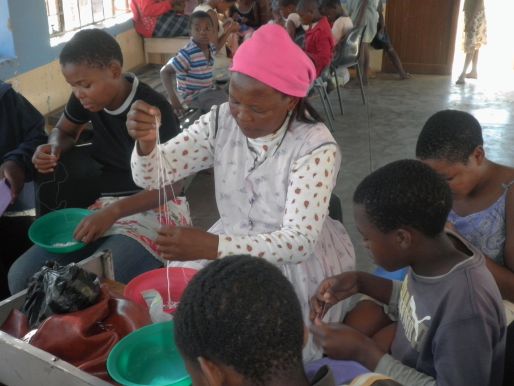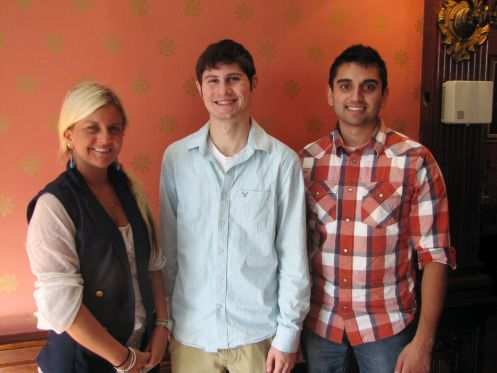Building upon an unfunded business plan hatched in last year’s ECG 200: People, Planet and Profit class, a group of students formed Cabrini’s first Students in Free Enterprise club in order to create a sustainable future for the orphans and vulnerable children in Swaziland.
Their program to create sustainable business growth and income for children residing at the hostel in St. Philip’s by making and selling Fair Trade bracelets has seen great early success. It represents a proof of concept on SIFE’s original model.
“When we do something, there is often an argument; do we teach somebody how to fish, or do we give them a fish? You know what? We do both. Because both are necessary,” Sister Barbara Staley, member of the Cabrini Sisters, said. “We are taught to provide direct service through Catholic social teaching but must create a structural level to build upon.”
After a 2010 faculty immersion trip aimed toward establishing a sustained partnership between Cabrini College and the Cabrini Ministries, Dr. Erin McLaughlin, assistant professor of business administration, became more involved in teaching her students about Fair Trade rather than free trade.
The Cabrini Ministries were in need of help with education and childcare and the idea was to provide help for them, but also to help students create and become global citizens of the world. Faculty wanted students to become exposed to Swaziland and the issues there to create a well-rounded student. From that trip, the partnership was strengthened to accomplish goals on each end.
“One of the things we struggle with here and write about each week and reflect and pray about and strive to teach is the difference between social justice and charity,” Susan Pierson, assistant professor of education, said. “Part of being involved in this partnership is that in some small way we are to bring about social justice.”
Staley stopped to visit students and faculty on her way to advocate in Washington, D.C. While speaking on Oct. 18, she addressed the positive impact the partnership, particularly Swazi’s Crafts for Care, is making on the lives of OVC.
“I think Sister Barbara coming to speak with us just inspired us to keep going with the project because it’s draining to do all of this aside from school,” Pat Schneider, senior marketing major and president of SIFE, said. “To have someone like her come was extra motivation.”
Students last semester raised over $1,400 by making and selling hemp bracelets, as well as raffling Easter baskets. This money was used to supply the Swazi youth with materials and also pay the children fair wages for their work.
Receiving those wages motivated the Swazi youth to build upon their craft making for further profits.
Bracelets identical to those sold by Cabrini students, cardboard journals and scarves are some of the crafts being sold.
“People have been generous and it’s just awesome that there is no middle-man taking away the profits of what they have been making,” Dijana Ilic, junior marketing major, said. “They get all that money directly back into their funds so they can live off of it.”
Although not able to become Fair Trade certified yet, Global Gifts in Wayne, Pa. has agreed to sell the crafts. Students involved with SIFE also sold bracelets to the Board of Trustees, raising approximately $400 this past weekend.
The partnership and projects are not only benefiting the mission in Swaziland, but also changing the lives of those becoming aware and involved at Cabrini.
“You don’t get many chances to directly help someone living in a third-world country,” Ilic said. “Helping people, especially those who have lost parents, which is unimaginable to most of us here, is so rewarding.”
As one of the original students responsible for the business plan and Swazi’s Crafts for Care, Ilic appreciates both the change she is affecting and the hands-on dimension to the normal business classroom experience.
“I think the students are learning how to apply business concepts and how those concepts could affect people in need,” McLaughlin said. “How it could change the lives of people in need, and the power of that? The difference between serving food in a soup kitchen and actually effectively changing the life of an individual and I think that is the greatest thing they will get out of this experience.”
Ultimately, Staley credits the Cabrini students and their business plan for helping her and the Swazi youth spur development and break new ground in terms of sustainability and successful futures.
“The things that you guys have taken on are the things that we dream of and want to do, but we don’t have the capacity or the energy or the will to do it to make it happen. You’re helping to make it happen for us,” Staley said.
“It’s an ongoing process and it’s just amazing that you can impact someone’s life half-way across the world,” Ilic said.




